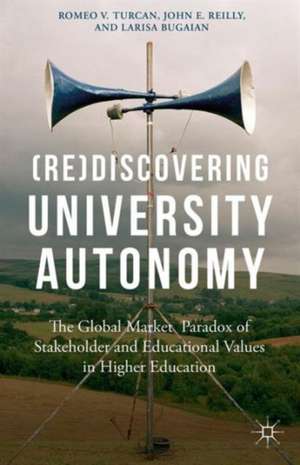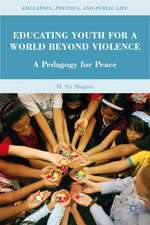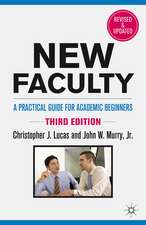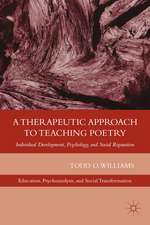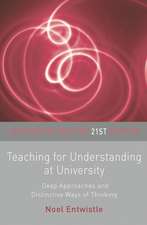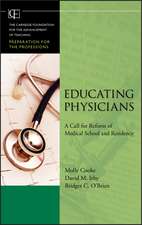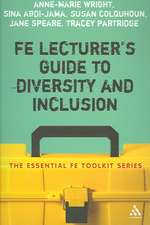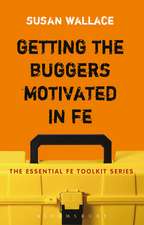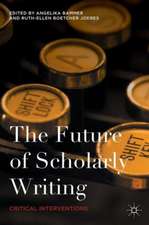(Re)Discovering University Autonomy: The Global Market Paradox of Stakeholder and Educational Values in Higher Education
Editat de Romeo V. Turcan, John E. Reilly, Larissa Bugaianen Limba Engleză Hardback – 16 noi 2015
| Toate formatele și edițiile | Preț | Express |
|---|---|---|
| Paperback (1) | 387.75 lei 6-8 săpt. | |
| Palgrave Macmillan US – 18 noi 2015 | 387.75 lei 6-8 săpt. | |
| Hardback (1) | 393.52 lei 6-8 săpt. | |
| Palgrave Macmillan US – 16 noi 2015 | 393.52 lei 6-8 săpt. |
Preț: 393.52 lei
Nou
Puncte Express: 590
Preț estimativ în valută:
75.30€ • 82.05$ • 63.45£
75.30€ • 82.05$ • 63.45£
Carte tipărită la comandă
Livrare economică 23 aprilie-07 mai
Preluare comenzi: 021 569.72.76
Specificații
ISBN-13: 9781137393821
ISBN-10: 1137393823
Pagini: 268
Ilustrații: XVII, 268 p.
Dimensiuni: 155 x 235 x 20 mm
Greutate: 0.54 kg
Ediția:1st ed. 2016
Editura: Palgrave Macmillan US
Colecția Palgrave Macmillan
Locul publicării:New York, United States
ISBN-10: 1137393823
Pagini: 268
Ilustrații: XVII, 268 p.
Dimensiuni: 155 x 235 x 20 mm
Greutate: 0.54 kg
Ediția:1st ed. 2016
Editura: Palgrave Macmillan US
Colecția Palgrave Macmillan
Locul publicării:New York, United States
Cuprins
PART I: INTRODUCTION
1. The Challenge of University Autonomy; John E. Reilly, Romeo V. Turcan, Larisa Bugaian
PART II: GOVERNMENT-UNIVERSITY INTERFACE
2. Higher Education, Governance, and Academic Freedom; William M. Bowen, Michael Schwartz
3. Cultural and Constitutional Embeddedness of University Autonomy in Lithuania; Žilvinas Martinaitis, Simonas Gaušas, Agnė Paliokaitė
4. Higher Education in India at Crossroads: The Imperative for Transcending Stagnation and Embracing Innovation; Sharad Sarin, Nikhilesh Dholakia
5. University Autonomy in the Age of Marketisation; Colin Simpson, Marin Marinov
PART III: UNIVERSITY-ACADEMIC STAFF INTERFACE
6. University-Staff Tensions in Implementing Human Resource Autonomy in Practice: The Example of Moldova; Larisa Bugaian, Ala Cotelnic, Angela Niculita, Daniela Pojar, Petru Todos, Romeo V. Turcan
7. Staff Evaluation Systems – Shaping Autonomy through Stakeholders; Mikael Collan, Jan Stoklasa, Jana Talasova
8. Institutional Financial Autonomy in Practice: A Departmental Perspective; Witold Szwebs
PART IV: ACADEMIC STAFF-STUDENTS INTERFACE
9. When Students Take the Lead; Erik de Graaff, Jette Egelund Holgaard, Pia Bøgelund, Claus Monrad Spliid
10. Autonomy Produces Unintended Consequences: Funding Higher Education through Vouchers in Lithuania; Simona Švaikauskienė, Birutė Mikulskienė
PART V: UNIVERSITY-BUSINESS INTERFACE
11. Autonomy Mediated through University-Business Collaboration; Olav Jull Sørensen
12. Industry-Academia-Government Cooperation in Japan: The Pivotal Role of the University and Implications for Autonomy; Yukiko Yamaguchi, Nikhilesh Dholakia
PART VI: UNIVERSITY-INTERNATIONALIZATION INTERFACE
13. Combining Internationalization and Autonomy: The Case of Russia; Andrei Panibratov, Lyubov Ermolaeva
14. Autonomy and the Realities of Internationalization in Australian Universities: An Institutional Logics Perspective; Mark Tayar, Robert Jack
15. UniversityInternationalization and University Autonomy: Toward a Theoretical Understanding; Romeo V. Turcan, Valeria Gulieva
PART VII: CONCLUSIONS
16. (Re)Discovering University Autonomy; John E. Reilly, Romeo V. Turcan, Larisa Bugaian
1. The Challenge of University Autonomy; John E. Reilly, Romeo V. Turcan, Larisa Bugaian
PART II: GOVERNMENT-UNIVERSITY INTERFACE
2. Higher Education, Governance, and Academic Freedom; William M. Bowen, Michael Schwartz
3. Cultural and Constitutional Embeddedness of University Autonomy in Lithuania; Žilvinas Martinaitis, Simonas Gaušas, Agnė Paliokaitė
4. Higher Education in India at Crossroads: The Imperative for Transcending Stagnation and Embracing Innovation; Sharad Sarin, Nikhilesh Dholakia
5. University Autonomy in the Age of Marketisation; Colin Simpson, Marin Marinov
PART III: UNIVERSITY-ACADEMIC STAFF INTERFACE
6. University-Staff Tensions in Implementing Human Resource Autonomy in Practice: The Example of Moldova; Larisa Bugaian, Ala Cotelnic, Angela Niculita, Daniela Pojar, Petru Todos, Romeo V. Turcan
7. Staff Evaluation Systems – Shaping Autonomy through Stakeholders; Mikael Collan, Jan Stoklasa, Jana Talasova
8. Institutional Financial Autonomy in Practice: A Departmental Perspective; Witold Szwebs
PART IV: ACADEMIC STAFF-STUDENTS INTERFACE
9. When Students Take the Lead; Erik de Graaff, Jette Egelund Holgaard, Pia Bøgelund, Claus Monrad Spliid
10. Autonomy Produces Unintended Consequences: Funding Higher Education through Vouchers in Lithuania; Simona Švaikauskienė, Birutė Mikulskienė
PART V: UNIVERSITY-BUSINESS INTERFACE
11. Autonomy Mediated through University-Business Collaboration; Olav Jull Sørensen
12. Industry-Academia-Government Cooperation in Japan: The Pivotal Role of the University and Implications for Autonomy; Yukiko Yamaguchi, Nikhilesh Dholakia
PART VI: UNIVERSITY-INTERNATIONALIZATION INTERFACE
13. Combining Internationalization and Autonomy: The Case of Russia; Andrei Panibratov, Lyubov Ermolaeva
14. Autonomy and the Realities of Internationalization in Australian Universities: An Institutional Logics Perspective; Mark Tayar, Robert Jack
15. UniversityInternationalization and University Autonomy: Toward a Theoretical Understanding; Romeo V. Turcan, Valeria Gulieva
PART VII: CONCLUSIONS
16. (Re)Discovering University Autonomy; John E. Reilly, Romeo V. Turcan, Larisa Bugaian
Recenzii
"The demands on universities and the threats to university autonomy have never been greater than they are today. Drawing on contributions from European and North American writers, this thought-provoking book demonstrates the scale of the challenge faced by universities and develops a model of institutional university autonomy that befits the modern sector." - Sara Carter, Order of the British Empire, Professor and Associate Deputy Principal, University of Strathclyde, UK
"This book touches on one of the most important and global issues in higher education from a holistic perspective. Its implications for policy, research, institutions, and practice are of relevance and interest not only to mature systems but also non-western emerging countries." - Futao Huang, Professor, Research Institute for Higher Education, Hiroshima University, Japan
"Effective, accountable university autonomy is a key element in the reform and modernization of higher education. By bringing together case studies from countries with contrasting traditions of higher education, this book demonstrates the international character of the autonomy debate. It provides insights that contribute to our understanding of autonomy and it identifies topics for further research on the implementation of autonomy that will be valuable for institutions and policy makers." - Klaus Haupt, Head of Tempus Unit, Education, Audiovisual and Culture Executive Agency, European Commission
The endorsement expressed herein by Mr. Klaus Haupt reflects his own view and does not engage or commit the European Commission or the Education, Audiovisual and Culture Executive Agency in any way.
"University autonomy has been a seminal principle in human history, enshrining the institutional and academic freedoms that have given birth to much of human knowledge. But it's a principle that is becoming ever harder to understand and maintain in today's marketized, internationalized world. Turcan, Reilly, and Bugaian's excellent collection sheds much-needed light on the challenges and offers a concise theoretical framework to help frame future debate." - Norman M. Fraser, Visiting Fellow, Henley Business School, University of Reading, UK
"This book, which has grown out of a project on university autonomy funded by the European Union, illustrates the complexities, ambiguities, and tensions arising from different perspectives of university autonomy and the extent to which interactions between stakeholders modify understanding of the concept and its realization in practice. The case studies reveal that the topic is a global one and that international collaboration in this field, as in others, can contribute to the development of policy and practice. The European Union continues to promote and support international higher education cooperation and development through its Erasmus+ programme." - Claire Morel, Head of the Unit for International Cooperation, Directorate General for Education and Culture, European Commission
The endorsement expressed herein by Mrs. Claire Morel reflects her own view and does not engage or commit the European Commission or the Directorate General for Education and Culture in any way.
"This book introduces and clearly articulates the pivotal role institutional university autonomy has for universities. It emphasizes the importance of a deep understanding of the different stakeholder tensions in this process." - Andy Lowe, Fellow of the Grounded Theory Institute, USA
"This book touches on one of the most important and global issues in higher education from a holistic perspective. Its implications for policy, research, institutions, and practice are of relevance and interest not only to mature systems but also non-western emerging countries." - Futao Huang, Professor, Research Institute for Higher Education, Hiroshima University, Japan
"Effective, accountable university autonomy is a key element in the reform and modernization of higher education. By bringing together case studies from countries with contrasting traditions of higher education, this book demonstrates the international character of the autonomy debate. It provides insights that contribute to our understanding of autonomy and it identifies topics for further research on the implementation of autonomy that will be valuable for institutions and policy makers." - Klaus Haupt, Head of Tempus Unit, Education, Audiovisual and Culture Executive Agency, European Commission
The endorsement expressed herein by Mr. Klaus Haupt reflects his own view and does not engage or commit the European Commission or the Education, Audiovisual and Culture Executive Agency in any way.
"University autonomy has been a seminal principle in human history, enshrining the institutional and academic freedoms that have given birth to much of human knowledge. But it's a principle that is becoming ever harder to understand and maintain in today's marketized, internationalized world. Turcan, Reilly, and Bugaian's excellent collection sheds much-needed light on the challenges and offers a concise theoretical framework to help frame future debate." - Norman M. Fraser, Visiting Fellow, Henley Business School, University of Reading, UK
"This book, which has grown out of a project on university autonomy funded by the European Union, illustrates the complexities, ambiguities, and tensions arising from different perspectives of university autonomy and the extent to which interactions between stakeholders modify understanding of the concept and its realization in practice. The case studies reveal that the topic is a global one and that international collaboration in this field, as in others, can contribute to the development of policy and practice. The European Union continues to promote and support international higher education cooperation and development through its Erasmus+ programme." - Claire Morel, Head of the Unit for International Cooperation, Directorate General for Education and Culture, European Commission
The endorsement expressed herein by Mrs. Claire Morel reflects her own view and does not engage or commit the European Commission or the Directorate General for Education and Culture in any way.
"This book introduces and clearly articulates the pivotal role institutional university autonomy has for universities. It emphasizes the importance of a deep understanding of the different stakeholder tensions in this process." - Andy Lowe, Fellow of the Grounded Theory Institute, USA
Notă biografică
Author Romeo V. Turcan: Romeo V. Turcan is Associate Professor of International Business and Entrepreneurship at the Department of Business Studies at Aalborg University, Denmark. His main research interests relate to cross-disciplinary theory building, and new sector and new venture legitimation. Turcan founded and co-coordinates the Theory Building Research Programme and the PhD course on Theorizing and Theory Building in Management Research; he also coordinates a large TEMPUS project on Enhancing University Autonomy in Moldova. Turcan has business experience in the NGO, power, oil, military high-tech, and management consulting sectors.Author John E. Reilly: John E. Reilly is a Higher Education Consultant with extensive experience of European and International Higher Education. With Ard Jongsma, Reilly has produced studies for the European Commission on University Governance and Management, and on University Quality Assurance in the Tempus countries. Other areas of interest are: credit and recognition systems, in particular the European credit and accumulation system; student and staff mobility; work placements; tuning methodology approach to curriculum development; joint program of study in all three cycles (bachelor, master, doctorate); the European Higher Education Area and the Bologna Process; developments in higher education in Africa.Author Larisa Bugaian: Larisa Bugaian is Professor of Economics and Management and Vice-Rector of Research at the Technical University of Moldova. Her main research interests are in economics, management, entrepreneurship, and business development. Bugaian is one of the higher education reform experts on the implementation of the Bologna agreement in Moldova, and a member of the Bologna Structural Reforms Working Group and Bologna Ad-Hoc Working Group on the Third Cycle. She has extensive experience in the field of consultancy and training managers and consultants within a number of international projects funded by USAID, TACIS, and the World Bank.
